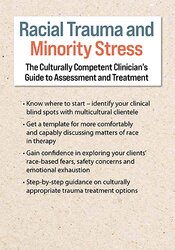
×

Violent and unjust deaths televised on 24-hour loops. The terrifying stress of traffic stops. Walking into a store and being followed by a clerk.
Race-based stressors can leave BIPOC clients overwhelmed with fear, anxiety, hopelessness and emotional exhaustion. The raw pain and trauma of each experience adding another excruciating burden they must carry.
Without addressing race-based issues at the heart of their trauma, you’ll fail to move clients facing the distress of daily assaults on their dignity toward greater hope and healing.
But where do you start?
Lillian Gibson, Ph.D., is a licensed clinical psychologist who has spent her career working to enhance the lives of people in marginalized groups.
In this one-day training, Dr. Gibson will give you the tools and guidance you need to better align with your clients race-based experiences, strengthen the therapeutic alliance and more capably treat clients with trauma rooted in racism.
Join her and discover how you can:
PLUS this program includes scripts, interactive exercises and case studies to help you more comfortably and capably discuss race related matters in therapy.
Don’t miss this chance to bring healing change to those facing the trauma of racism.
Register today!
All members of the PESI, Inc. planning committee have provided disclosures of financial relationships with ineligible organizations and any relevant non-financial relationships prior to planning content for this activity. None of the committee members had relevant financial relationships with ineligible companies or other potentially biasing relationships to disclose to learners. For speaker disclosures, please see the faculty biography.
Continuing education credit information is coming soon for this live webcast.

Lillian Gibson, PhD, is a licensed clinical psychologist who works with clients facing race-based traumas, minority stress, anxiety, depression, trauma, insomnia, nightmares, and chronic medical conditions.
Dr. Gibson is a highly recommended speaker, consultant, and clinician who is frequently engaged by non-profit agencies, community-based programs, and mental health agencies to inform and train their staff on culture-affirming best practices for both employees and patients.
Experienced in a variety of settings including inpatient mental health centers, outpatient behavioral care services, and primary care settings, Dr. Gibson’s professional footprints include places such as Johns Hopkins Medicine and the Quality Education for Minorities Network. Dr. Gibson has also conducted international research in Johannesburg, South Africa.
Speaker Disclosures:
Financial: Dr. Lillian Gibson maintains a private practice. She receives compensation as an independent consultant. She receives a speaking honorarium and recording royalties from PESI, Inc. She has no relevant financial relationships with ineligible organizations.
Non-financial: Dr. Lillian Gibson has no relevant non-financial relationships.
For live CE credit, you must watch the live webcast in its entirety at its scheduled time and complete the CE quiz and evaluation within one week. You will have access for 90 days after the program for review.
Please note: There will be a 70-minute lunch and two 15-minute breaks; one in the morning and one in the afternoon. Lunch and break times will be announced by the speaker and at their discretion. A more detailed schedule is available upon request.
Visit our FAQ page at https://www.pesicanada.ca/faq or contact us at https://www.pesicanada.ca/contact-us.
Satisfaction Guarantee
Your satisfaction is our goal and our guarantee. Concerns should be addressed to info@pesicanada.com.
Please wait ...